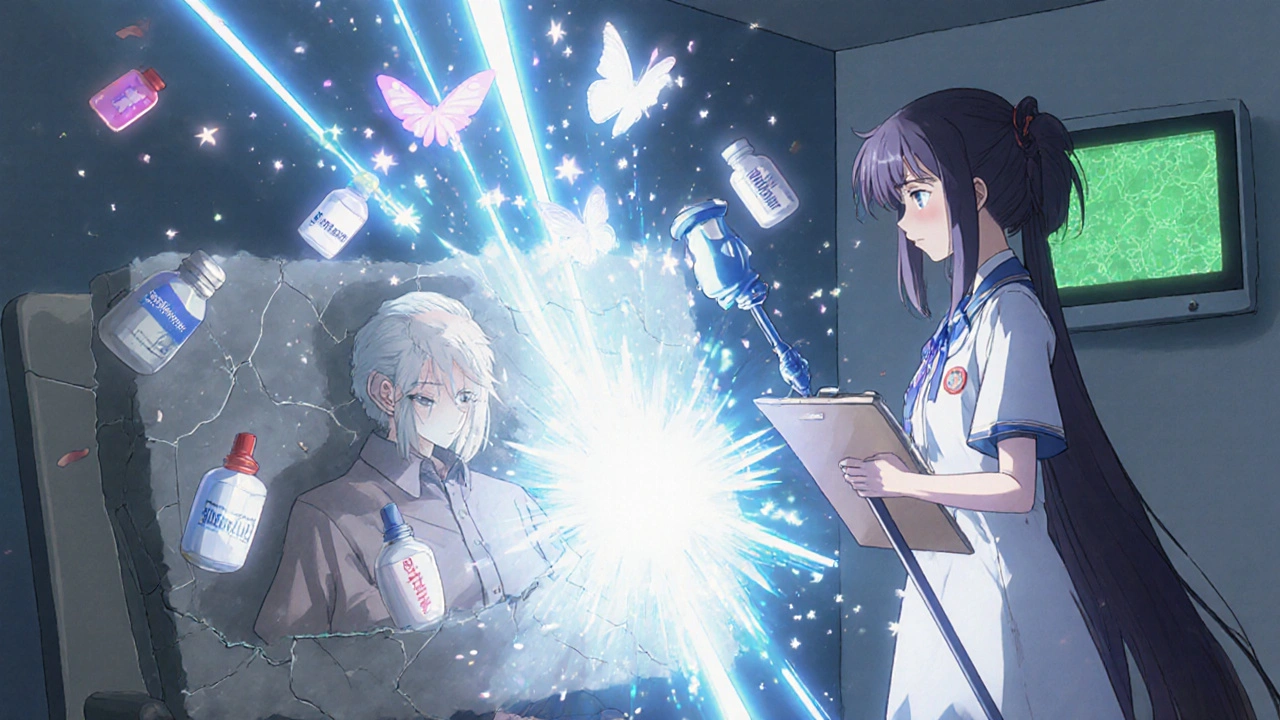What Is Medication-Induced Delirium?
Medication-induced delirium isn’t just confusion or forgetfulness. It’s a sudden, sharp change in how a person thinks, pays attention, or behaves-often happening within hours or days after starting or changing a medication. This isn’t dementia slowly getting worse. It’s a medical emergency that can turn a calm, alert senior into someone who doesn’t recognize their own family, talks nonsense, or sits quietly for hours without moving. And the worst part? It’s often caused by drugs that doctors and caregivers think are harmless.
Every year in the U.S., over 2.6 million older adults develop delirium in the hospital. Nearly half of those cases are linked to medications. And while it’s reversible if caught early, it’s also deadly: people with delirium are twice as likely to die within a year compared to those without it. They also spend nearly a week longer in the hospital and recover slower, even months after discharge.
Who’s Most at Risk?
It’s not just about age. While people over 65 are at higher risk, those over 85 face more than double the chance of developing medication-induced delirium. People with existing dementia, Parkinson’s, or a history of stroke are especially vulnerable. So are those taking multiple medications-three or more with anticholinergic effects-and those who’ve had delirium before.
Even a single new drug can trigger it. A 78-year-old woman with arthritis starts taking diphenhydramine (Benadryl) for sleep. Within three days, she stops recognizing her daughter, thinks she’s in a hotel, and tries to walk out the door. Her family blames aging. The doctor blames dementia. No one connects it to the new pill.
The Top Medications That Cause It
Not all drugs are created equal when it comes to delirium risk. Some are quietly dangerous in older adults. The biggest offenders fall into three categories:
- Anticholinergics-These block acetylcholine, a brain chemical critical for memory and attention. Common ones include diphenhydramine (Benadryl), oxybutynin (for overactive bladder), amitriptyline (for pain or depression), and even some cold and allergy meds. Every extra point on the Anticholinergic Cognitive Burden Scale (ACB) increases delirium risk by nearly 70%. A score of 3 or higher? That’s a red flag.
- Benzodiazepines-Drugs like lorazepam (Ativan) and diazepam (Valium) are often used for anxiety or sleep. But they’re linked to a threefold increase in delirium risk. Even short-term use in hospitals can trigger it. ICU patients on benzodiazepines stay in delirium 2.3 days longer than those who aren’t.
- Opioids-Morphine is a common culprit. But hydromorphone (Dilaudid) carries a 27% lower risk at the same pain-relieving dose. Meperidine (Demerol) is especially dangerous because of its toxic byproduct, normeperidine, which can overstimulate the brain.
Even some antibiotics like ciprofloxacin and antipsychotics like quetiapine-often thought to be safe-are now on the 2023 Beers Criteria list for high-risk medications in seniors.
How It Shows Up: The Three Faces of Delirium
Delirium doesn’t look the same in everyone. It comes in three forms:
- Hyperactive-Restless, agitated, yelling, hallucinating. This one’s easy to spot.
- Hypoactive-Quiet, withdrawn, sleepy, unresponsive. This is the silent killer. It makes up 72% of medication-induced cases in older adults and is mistaken for depression, fatigue, or just "getting old."
- Mixed-Switches between the two. One hour they’re calm, the next they’re yelling at the wall.
Most families don’t notice the hypoactive type until it’s too late. A loved one stops eating, doesn’t answer questions, and just stares at the TV. No one thinks to ask: "Did this start after we gave them that new pill?"

Why It’s So Easy to Miss
Doctors and nurses are stretched thin. Families assume confusion is normal with age. Nurses trained to spot delirium? Only 35% can correctly identify hypoactive symptoms. That means over 70% of cases go undiagnosed.
Medication-induced delirium is often blamed on dementia. But dementia doesn’t come on suddenly. It creeps in over months or years. Delirium? It hits like a lightning strike. If your mom was sharp last week and now she doesn’t know the day or her own name-that’s not dementia. That’s a drug reaction.
How to Prevent It
Here’s the good news: medication-induced delirium is one of the most preventable conditions in older adults. You don’t need fancy tech or expensive tests. You need three simple steps:
- Review every medication-Ask the doctor: "Which of these drugs could be causing confusion?" Use the Beers Criteria® list. If they’re on diphenhydramine, oxybutynin, or amitriptyline, ask for alternatives. Loratadine (Claritin) instead of Benadryl. Mirabegron instead of oxybutynin. SSRIs instead of amitriptyline.
- Use the STOPP/START guidelines-This is a tool hospitals use to find inappropriate meds and miss needed ones. It cuts delirium risk by 26%. Ask your pharmacist to run this check during every medication review.
- Start low, go slow-Never start a new drug without a plan to taper it if needed. Benzodiazepines? Only use them for seizures or alcohol withdrawal. Never for sleep. Opioids? Combine them with acetaminophen and non-drug pain relief like heat, massage, or positioning. This cuts opioid use by 37%.
And if you’re in the hospital? Ask if they’re using the Confusion Assessment Method (CAM) to screen for delirium daily. Hospitals that use it have 32% fewer cases.
What to Do If You Suspect Delirium
If your loved one suddenly seems off-confused, quiet, agitated, or unresponsive-do this:
- Check their meds. Did anything change in the last 3 days?
- Look for signs of infection-fever, urinary urgency, redness, new cough. Infection can trigger delirium too.
- Stop all non-essential meds immediately-especially anticholinergics and benzodiazepines. Don’t wait for the doctor. Call the nurse.
- Get them hydrated, awake, and oriented. Bring familiar photos. Talk to them. Keep the lights on during the day. Turn off the TV at night.
Delirium can resolve in days once the trigger is removed. But the longer it goes untreated, the harder it is to recover. And the higher the chance of permanent cognitive damage.

What Hospitals Are Doing Now
More hospitals are waking up. Since 2020, 68% have implemented formal delirium prevention programs. The Hospital Elder Life Program (HELP), created at Yale, reduces delirium by 40% by combining medication reviews with simple things like walking, reorientation, and sleep hygiene.
The FDA now requires stronger warnings on anticholinergic labels. The National Institute on Aging is funding real-time EHR alerts that flag high anticholinergic burden. AI tools are being tested to predict delirium risk based on medication combinations-with 84% accuracy.
But progress is slow. A 2023 study found that 43% of hospitals still routinely prescribe high-risk drugs to seniors. Only 18% screen for anticholinergic burden systematically.
What You Can Do Today
You don’t need to be a doctor to protect someone you love. Here’s your action plan:
- Make a complete list of every medication-prescription, OTC, supplements, patches, creams. Include dosages and why they’re taken.
- Go to HealthinAging.org and check the Beers Criteria® list. See if any meds are flagged.
- Ask the pharmacist: "Which of these have strong anticholinergic effects?"
- Never give diphenhydramine to an older adult for sleep. Ever.
- If your loved one is in the hospital, ask daily: "Are you screening for delirium?"
Medication-induced delirium isn’t inevitable. It’s a failure of awareness, not medicine. With better knowledge, better tools, and better questions, we can stop it before it starts.
How Much Does This Cost?
Medication-induced delirium isn’t just a health crisis-it’s a financial one. In the U.S., it adds $164 billion a year to healthcare costs. That’s more than Alzheimer’s disease. And since 2018, Medicare has refused to pay for complications from hospital-acquired delirium. Hospitals now have a financial reason to prevent it.
But prevention costs less than treatment. A simple medication review takes 15 minutes. A delirium episode can cost $10,000 in extra hospital days. For families, the cost is even higher: lost time, emotional trauma, and sometimes, a loved one who never fully comes back.
Final Thought: It’s Not Aging. It’s a Drug Reaction.
When an older adult suddenly changes, we blame time. We say, "They’re just getting forgetful." But sometimes, it’s not aging. It’s a pill they took yesterday. Or last week. Or that their doctor added without realizing the risk.
Delirium isn’t a normal part of growing old. It’s a warning sign. And it’s one we can-and must-stop.

 Pharmacology
Pharmacology
Kartik Singhal
November 21, 2025 AT 23:30Logan Romine
November 23, 2025 AT 07:08Mark Kahn
November 23, 2025 AT 07:21Nikhil Purohit
November 25, 2025 AT 03:55Michael Marrale
November 25, 2025 AT 07:55David vaughan
November 26, 2025 AT 00:28Cooper Long
November 26, 2025 AT 14:22Sheldon Bazinga
November 27, 2025 AT 19:39Clifford Temple
November 28, 2025 AT 23:52Corra Hathaway
November 30, 2025 AT 19:31Shawn Sakura
December 2, 2025 AT 15:40Paula Jane Butterfield
December 4, 2025 AT 06:40Florian Moser
December 5, 2025 AT 15:37